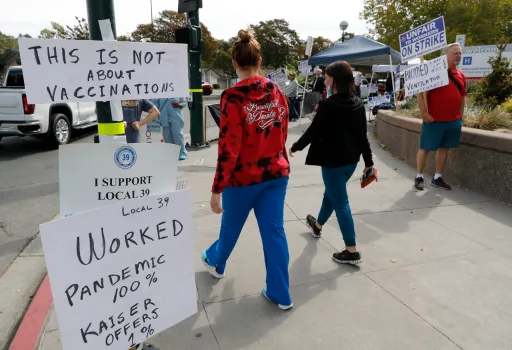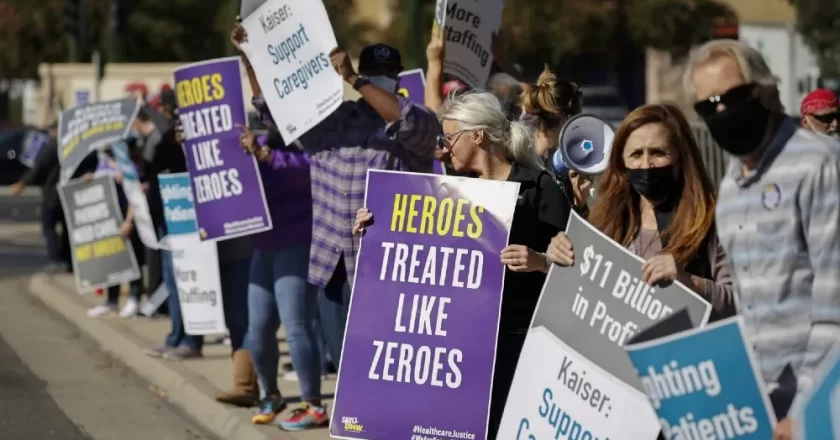In late September of this year, pharmacists working in numerous CVS locations began walking off jobs without union support. Employees took drastic measures in protest of unhealthy working conditions, namely high workloads paired with minimal staffing.
Soon after the initial strikes, stories spread to Reddit, a popular social news website. Pharmacists nationwide, employed by big-box drugstores such as CVS and Walgreens, were inspired and joined the strikes.
Ever since the rise of Covid, it has affected many industries, including healthcare. In past years, reports of local pharmacy closures and staffing shortages have popped up in numerous instances.
“The pharmacists, through Covid, have now had additional job responsibilities,” Ms. Lori Andress, GA school nurse, said. “Their job is getting larger, but they’re expected to do that job in the same amount of hours with the same pay.”
Many are quick to blame Covid for recent issues in pharmacies. However, as employees are being overworked, strikes could be symptomatic of deeper-rooted problems.
“I think Covid exposed the issues that were already there; I think it was going in that direction— it’s in all the industries,” Andress said. “The workers are working harder, but then they’re not making enough to make ends meet.”
It has become a common trend this year for corporations to make large sums of money, while lower-level employees rarely see any increase in wages. One example would be the Union Auto Workers strike that occurred this September to protest low wages. Big-box drugstore chains are among the few corporations to benefit from Covid.
“I think vaccination became a pretty big revenue stream for places like CVS and Walgreens during Covid,” Mr. Jamie Murray, faculty advisor of GA’s Finance Club, said. “Publicly traded companies, like CVS and Walgreens, are trying to make money, and the way they do that is to control their staffing expenses.”
Although pharmacies have been profiting from the global pandemic, pharmacists have not seen wages increase parallel to their companies’ economic growth. The lack of increased wages is a leading factor in strikes that have been occurring.
To many, pharmacist strikes may seem distant, as they do not play a large role in prolonged one-on-one doctor-patient interactions, similar to the way physicians do. Nonetheless, pharmacists are vital to healthcare.
“My parents are doctors, and I hear them referring patients to pharmacies like CVS very often,” said Vincent Zhou ’26. “But I’m not exactly sure what role pharmacists themselves play other than distributing medicine.”
Many patients and primary-care physicians currently rely on local pharmacy chains. They are essential in delivering medicine that is individualized to the patient.
“The pharmacists are one of the links in making someone healthy,” Andress said. “You go to the doctor, the doctor writes your prescription, and you have to go to the pharmacy to get your antibiotics.”
Moreover, if issues within workplaces are not resolved quickly, a shortage of pharmacists could greatly affect the well-being of the average American.
“If there’s a shortage of healthy workers, there’s going to be a slower production of new drugs and even getting EpiPens, different antibiotics, and shortages in insulin,” said Andress. “If we’re short on insulin, then you have, unfortunately, more fatalities.”
Strikes are a cry by pharmacists to have their voices heard. Since walk-offs have all been nonunion strikes, also referred to as wildcat strikes, pharmacists are not receiving any financial compensation from unions for the days they take off from work to protest.
“With the wildcat strikes, it’s sort of an expression of what the pharmacists truly want,” said Murray.

Both pharmacists and companies will face financial issues as strikes continue. Employees go unpaid and so do pharmacies.
“You need to listen to the pharmacists,” said Andress. “It’s not the money that they’re talking about; they feel like the patient care is suffering.”
Pharmacists administer vaccines, write prescriptions, and do so much more due to Covid. Yet many do not know the roles pharmacists play in healthcare, which could become apparent due to the shortages Andress mentioned from continued strikes. As walkouts persist, it is critical to be conscious of the potential effects a lack of pharmacists could have.
Sources:

